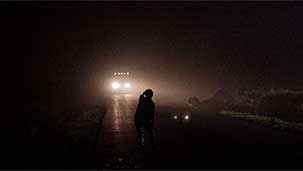You have the kind of job on a film that I would not envy. Your responsibilities include everything from negotiating terms of contracts, to liaising with rights departments, to managing broadcast agreements and conflict disputes. Tricky stuff. You would likely never find yourself in the same situation as the taxi driver Lao Shi, the protagonist of Old Stone. But, if you did, you’d probably find a way to get out of it.
Recalling the desperate urgency of recent films like A Better Life, L’Enfant and Two Days One Night, Canadian/Chinese director Johnny Ma’s first feature length film bills itself as a psychological thriller. In truth, Old Stone is more of a meditation on the soul-crushing futility of doing the right thing. After a drunken passenger causes Lao Shi to hit a motorcyclist, he takes responsibility for the man’s life by driving him to the hospital. This selfless act mushrooms into a Kafka-esque bureaucratic nightmare in which Lao Shi faces losing everything in order to keep a stranger alive.
You may have heard of the phenomenon in China called “hit to kill.” Thanks to Draconian victim compensation laws, when a driver hits a pedestrian, it’s better to kill them rather than merely injure them; and watching Lao Shi wade through the labyrinthine morass of insurance interviews and medical bills certainly makes the case for vehicular manslaughter.
Assuming this responsibility is a true test of character, and actor Gang Shen imbues Lao Shi with grim resignation. He’s the Chinese version of American Beauty’s Lester Burnham – a milquetoast who is controlled by his striving wife, and ignored by his spoiled daughter – and almost seems eager to prove that he is up to the challenge, if nothing else than to justify to himself that he can rise to the occasion. To feel that he is more than just a schlub behind the wheel of a cab.
The film is lean and assured, with spare dialogue, deliberate pacing, and the kind of understated yet mindful art direction you usually seen from filmmakers with many more years of experience than Ma. Lao Shi’s situation unfolds over weeks and months, yet bounces back and forth between the past and the present seamlessly. An opening shot of a forest of trees swaying in a thunderstorm hints at the film’s ever-escalating unease.
This is a morality play that hits all the right notes, from the crowd of bystanders shouting opinions over the injured man though refusing to offer help, to the socially awkward confrontations Lao Shi must endure in an upwardly-mobile modern-day China we rarely see. By the time the film comes to it’s mostly foregone conclusion, it is clear we have witnessed the emergence of Ma as an auteur with a strong and confident voice.
Filling out forms and combing over lines of text for inconsistencies is an integral part of getting most things done these days. Don’t get me wrong, your work is very important. But Old Stone reminds us that humanity is more important.
Sincerely,

Di







